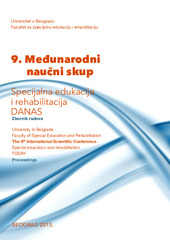Prikaz osnovnih podataka o dokumentu
Procena auditivnog ponašanja kod gluve i nagluve dece iz perspektive surdologa
Assessment of auditory behavior of deaf and hard of hearing children – teacher’s of deaf perspective
| dc.contributor | Vuković, Mile | |
| dc.creator | Ostojić, Sanja | |
| dc.creator | Đoković, Sanja | |
| dc.creator | Nikolić, Mina | |
| dc.creator | Mirić, Danica | |
| dc.creator | Babić, Mirjana | |
| dc.creator | Bojić, Danijela | |
| dc.date.accessioned | 2022-03-08T13:26:00Z | |
| dc.date.available | 2022-03-08T13:26:00Z | |
| dc.date.issued | 2015 | |
| dc.identifier.isbn | 978-86-6203-069-6 | |
| dc.identifier.uri | http://rfasper.fasper.bg.ac.rs/handle/123456789/4207 | |
| dc.description.abstract | Auditivno ponašanje se definiše kao sistem međusobno povezanih radnji, koje se vrše radi obavljanja neke funkcije (govor, komunikacija, svest o okruženju, funkcionalna nezavisnost), i koje zahteva interakciju subjekta sa njegovim okruženjem. Auditivno ponašanje podrazumeva specifičan odgovor na stimulaciju zvukom, govorom ili nekim drugim zvučnim stimulansom, i predstavlja socijalnu veštinu. Usvajanje auditivnog ponašanja gluve i nagluve dece (putem slušnog aparata/kohlearnog implanta) označava sazrevanje slušanja i komunikacije, koje omogućavaju samostalno i efikasno funkcionisanje u čujućem okruženju. Auditivno ponašanje se ispituje različitim vrstama upitnika za roditelje/staratelje, radi sticanja znanja o funkcionisanju amplifikovanih osoba u kontaktu sa drugima i u različitim životnim situacijama. Problem istraživanja bio je da se utvrdi učestalost auditivnog ponašanja kod gluve i nagluve dece, u odnosu na različite faktore koji mogu uticati na auditivno iskustvo deteta, iz perspective surdologa.Uzorak u ovom istraživanju je činilo 44 dece, uzrasta od dve do trinaest godina starosti, različitog uzrasta dijagnostike, vremena amplifikacije, dužine i intenziteta rehabilitacije slušanja i govora. Procenu učestalosti auditivnog ponašanja vršio je detetov terapeut- surdolog pomoću T.E.A.C.H. upitnika (Teacher’s Evaluation of Aural/ oral performance of Children. Ching, Hill, 2005). Rezultati istraživanja ukazuju da učestalost auditivnog ponašanja, prema proceni surdologa, u velikoj meri zavisi od faktora kao što su: vreme dijagnostike, amplifikacije i početka rehabilitacije, vrste amplifikacije, ali i intenziteta rehabilitacije. Auditivno ponašanje gluve i nagluve dece poboljšava se sa uzrastom deteta, primenom adekvatne amplifikacije i rehabilitacije, kao i sticanjem slušnog iskustva. | sr |
| dc.description.abstract | Auditory behavior is a system of dependant actions dedicated to certain functions (speech, communication, consciousness about environment, independent functioning), demanding interaction of a subject and environment. Auditory behavior is a social skill representing specific response to stimulation by sound, speech or other Acquiring auditory skills by deaf or hard of hearing children with a help of hearing aid or cochlear implant, could improve maturation of hearing and communication, thus enabling independent and efficient functioning in a hearing environment. Assessment of auditory behavior is done by a numerous questionnaires for parents/caregivers in order to learn about functioning of hearing impaired children in contact with others in various situations. The goal of this study was to assess factors affecting auditory behavior of deaf and hard of hearing children by teachers of deaf. The sample in this study was a group of 44 deaf and hard of hearing children aged 2 to 13 years with different time of identification, amplification, duraton and intensity of speech and hearing rehabilitation. Assessment of auditory behavior has been done by a child’s therapist using TEACH questionnaire (Teacher’s Evaluation of Aural/oral performance of Children. Ching, Hill, 2005). The results have shown that the pattern of auditory behavior, according to therapist’s assessment, is strongly affected by time of diagnosis, amplification and intervention, type of amplification and intensity of rehabilitation as well. Auditory behavior of deaf and hard of hearing children improves over time with the use of adequate amplification and rehabilitation and gaining auditory experience. | sr |
| dc.language.iso | sr | sr |
| dc.publisher | Univerzitet u Beogradu – Fakultet za specijalnu edukaciju i rehabilitaciju/ University of Belgrade – Faculty of Special Education and Rehabilitation | sr |
| dc.relation | info:eu-repo/grantAgreement/MESTD/Basic Research (BR or ON)/179055/RS// | sr |
| dc.rights | openAccess | sr |
| dc.rights.uri | https://creativecommons.org/licenses/by-sa/4.0/ | |
| dc.source | Zbornik radova - 9. Međunarodni naučni skup „Specijalna edukacija i rehabilitacija danas“, Beograd, Srbija, 25–27.9.2015 | sr |
| dc.subject | gluve i nagluve osobe | sr |
| dc.subject | auditivno ponašanje | sr |
| dc.subject | kohlearni implant | sr |
| dc.subject | amplifikacija | sr |
| dc.subject | deaf and hard of hearing children | sr |
| dc.subject | audiory behavior | sr |
| dc.subject | cochlear implantt | sr |
| dc.subject | amplification | sr |
| dc.title | Procena auditivnog ponašanja kod gluve i nagluve dece iz perspektive surdologa | sr |
| dc.title | Assessment of auditory behavior of deaf and hard of hearing children – teacher’s of deaf perspective | sr |
| dc.type | conferenceObject | sr |
| dc.rights.license | BY-SA | sr |
| dc.citation.epage | 56 | |
| dc.citation.spage | 49 | |
| dc.identifier.fulltext | http://rfasper.fasper.bg.ac.rs/bitstream/id/6449/Untitled6.pdf | |
| dc.identifier.rcub | https://hdl.handle.net/21.15107/rcub_rfasper_4207 | |
| dc.type.version | publishedVersion | sr |


